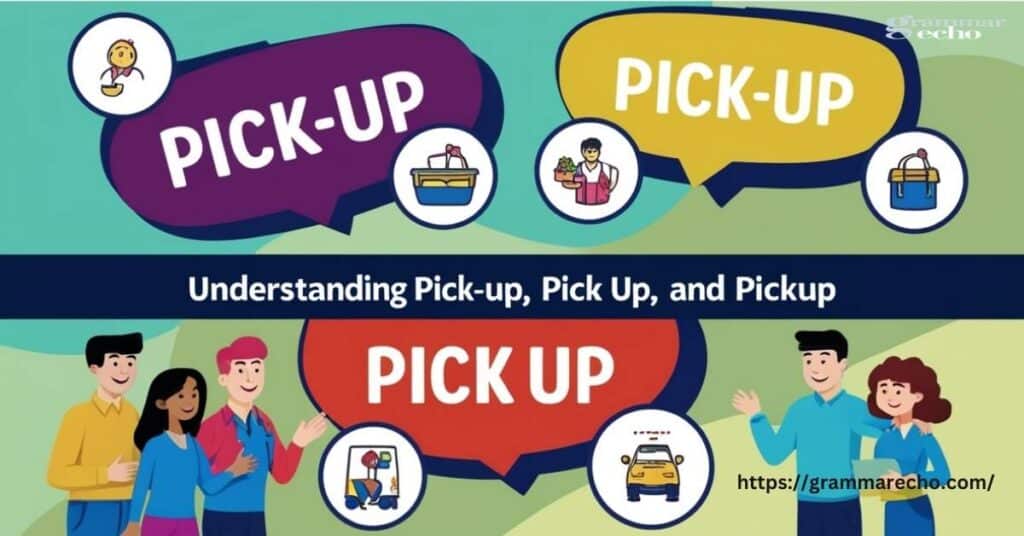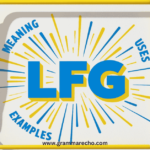Navigating the nuances of the English language can be tricky, especially when it comes to terms like pick-up, pick up, and pickup. These words often confuse many, leading to misunderstandings in both written and spoken communication. Understanding the correct usage of these terms is essential for clear expression.
In this article, we’ll delve into the definitions, contexts, and examples of each term. By the end, you’ll feel confident using pick-up, pick up, and pickup appropriately in your daily conversations. Let’s explore these terms and clarify their meanings, ensuring your language usage is both precise and effective.
Why is There Confusion?
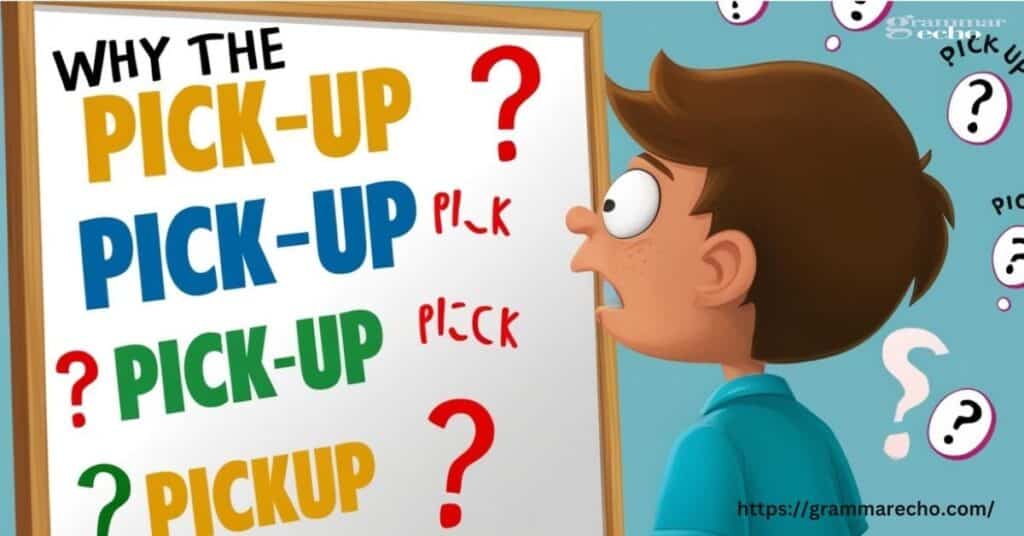
The confusion surrounding pick-up, pick up, and pickup stems primarily from their similar sounds and overlapping meanings. Many people use these terms interchangeably, which can lead to misunderstandings. For instance, in everyday conversation, someone might say they need to “pick up a package,” but they may not realize that this phrase can have different implications based on context.
Context Matters
Understanding the context is crucial when deciding which term to use. Let’s break down the differences:
- Pick-up (hyphenated form): Often used as a noun, referring to an event or action involving collection or retrieval.
- Pick up (verb phrase): Used to describe the action of collecting or lifting something.
- Pickup (single word): Generally refers to a type of vehicle or a service related to collection.
This distinction can affect clarity in communication, particularly in written language.
What is a “Pick-Up”?
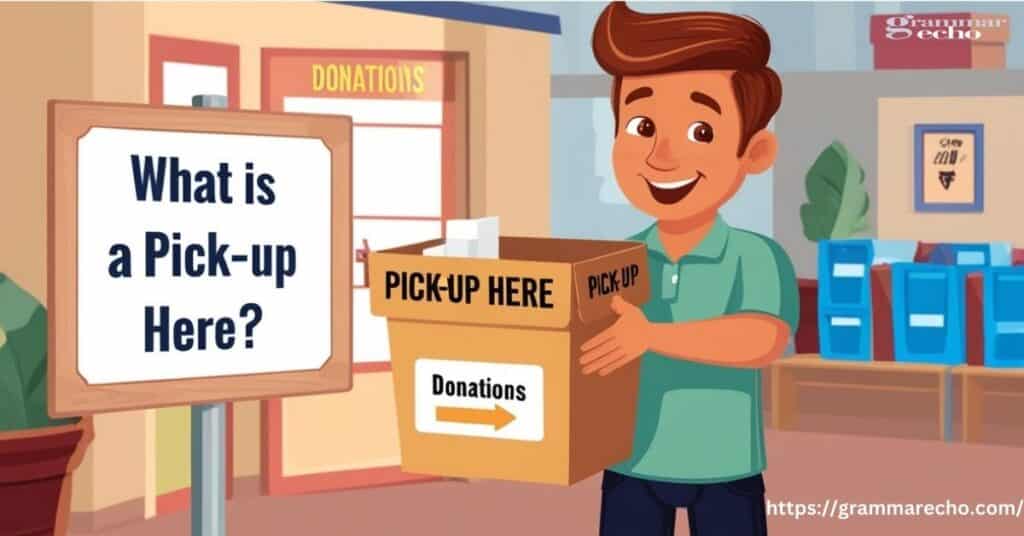
A pick-up is primarily a noun that describes an event or action where something is collected or retrieved. This term can be used in various scenarios. Here are some examples:
- Scheduled Pick-Up: “The scheduled pick-up for the recycling is every Thursday.”
- Pick-Up Event: “The charity is hosting a pick-up for donations this weekend.”
Examples in Context
- Scheduled Pick-Up: “I have a pick-up scheduled for my dry cleaning on Friday.”
- Pick-Up Location: “The pick-up for auction items is at the community center.”
These examples illustrate how the term pick-up functions within a sentence, emphasizing its role as a noun.
Must Read: Juxtaposition vs Paradox: What’s the Difference?
What Does the Phrase “Pick Up” Mean?

The phrase pick up is a verb phrase that describes the action of collecting or lifting something. It can apply to a variety of contexts, from physically lifting an object to the act of collecting items or people.
Scenarios for “Pick Up”
- Collecting Items: “I need to pick up my order from the store.”
- Fetching Someone: “Can you pick up my brother at the airport?”
Examples in Context
- Pick Up the Package: “I will pick up the package this afternoon.”
- Pick Up My Order: “Make sure to pick up my order before the store closes.”
These sentences highlight how pick up functions as an action that can occur in everyday life.
Must Read: Cart vs Kart: Which Spelling to Use?
What is a “Pickup”?
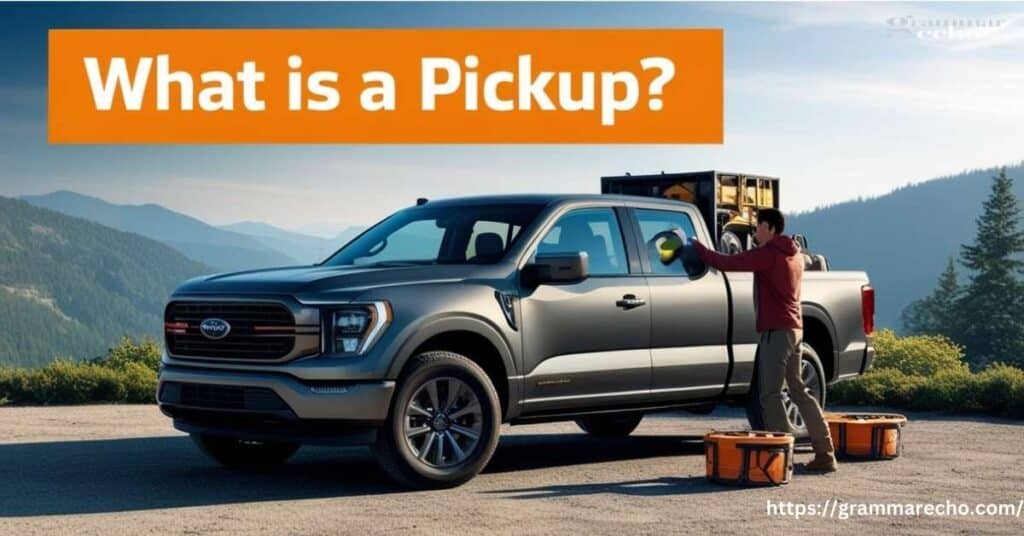
The term pickup is often used as a noun and commonly refers to a vehicle, specifically a pickup truck. Additionally, it can denote a service related to collection or delivery.
Understanding “Pickup”
Here are some contexts where pickup is appropriately used:
- Pickup Truck: “I bought a new pickup truck for hauling supplies.”
- Pickup Service: “The restaurant offers a pickup service for takeout orders.”
Examples in Context
- Pickup Location: “The pickup location for the groceries is at the front of the store.”
- Pickup Time: “What’s the pickup time for the scheduled collection?”
These examples clarify how pickup can refer to both a vehicle and a service, showcasing its versatility.
Which One Should You Use?
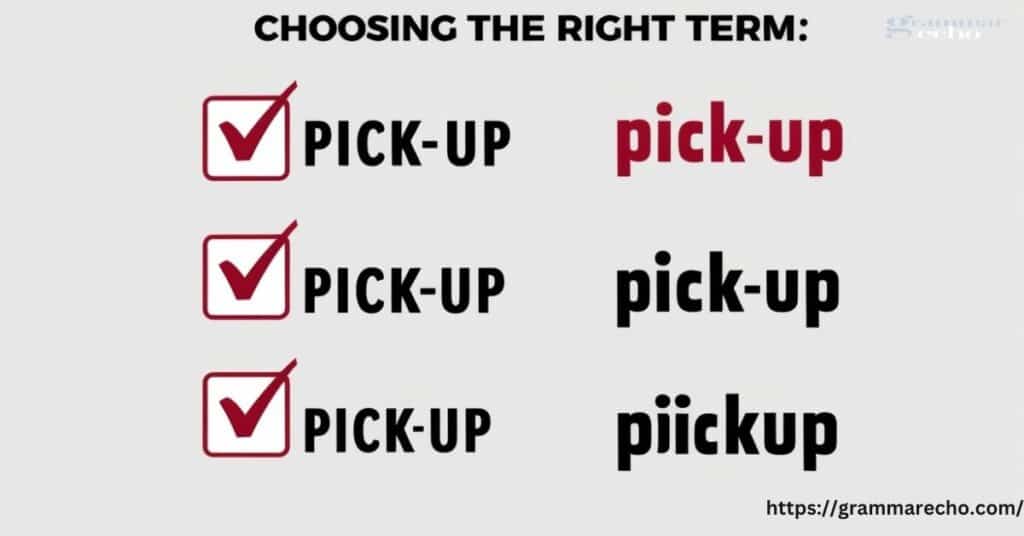
Choosing between pick-up, pick up, and pickup depends on the context in which you are communicating. Here are some guidelines to help you decide:
When to Use Each Term
- Pick-Up: Use this term when referring to an event or action as a noun.
- Example: “The pick-up for donations is at noon.”
- Pick Up: Opt for this phrase when describing the action of collecting or lifting something.
- Example: “I will pick up my friend from the airport.”
- Pickup: Use this term when talking about a type of vehicle or service.
- Example: “The pickup truck can carry heavy loads.”
Creating a Quick Reference Table
| Term | Part of Speech | Usage Example |
| Pick-Up | Noun | “The pick-up is scheduled for tomorrow.” |
| Pick Up | Verb Phrase | “I will pick up the groceries later.” |
| Pickup | Noun | “He drives a pickup truck.” |
Examples in Context
To further illustrate the differences, let’s look at several scenarios:
Scenario 1: Collecting Goods
- Pick-Up: “The pick-up for the auction items is scheduled for Saturday.”
- Pick Up: “I need to pick up the items I bought at the auction.”
- Pickup: “The pickup service for the auction is reliable.”
Scenario 2: Transportation
- Pick-Up: “The pick-up will occur at 5 PM for those who signed up.”
- Pick Up: “Can you pick up the kids from school today?”
- Pickup: “We drove the pickup to the campsite.”
Scenario 3: Services
- Pick-Up: “The pick-up for recycling occurs every two weeks.”
- Pick Up: “I will pick up my dry cleaning tomorrow.”
- Pickup: “The pickup for groceries is at the store entrance.”
These scenarios demonstrate how the terms are used in various contexts, helping to clarify their meanings.
Synonyms and Similar Terms
Understanding synonyms can also aid in grasping the nuances of these terms. Below we explore synonyms for each term.
Synonyms for “Pick-Up”
- Collection: Refers to gathering items or people.
- Retrieval: Implies the act of getting something back.
- Acquisition: Refers to obtaining something.
Synonyms for “Pick Up”
- Fetch: To go and bring something back.
- Lift: To raise something from a lower position.
- Collect: To gather items from various places.
Synonyms for “Pickup”
- Pickup Truck: A type of vehicle designed for transporting goods.
- Pickup Service: A service that collects items or people.
Creating a Synonym Table
| Term | Synonyms |
| Pick-Up | Collection, Retrieval, Acquisition |
| Pick Up | Fetch, Lift, Collect |
| Pickup | Pickup Truck, Pickup Service |
Origins of the Terms

Understanding the origin of these terms can provide additional context for their usage.
Etymology of “Pick-Up”
The pick-up originated in the early 20th century and was used to describe an act of picking something up or collecting items. The hyphenated form emphasizes the action as a noun.
Etymology of “Pickup”
The pickup emerged around the 1930s, primarily referring to a type of truck designed for transporting goods. Over time, it evolved to include services related to collection.
Etymology of “Pick Up”
The verb phrase “pick up” has been in use since the late 19th century, describing the action of lifting or collecting. Its versatility allows it to adapt to various contexts.
Final Thoughts
In conclusion, understanding the distinctions between pick-up, pick up, and pickup enhances your communication skills. Each term serves a unique purpose, whether referring to an action or a noun. By practicing their usage, you can avoid confusion and express yourself clearly.
FAQs
Pick-up is a noun for collection events, while pickup refers to a vehicle or service.
Use pick up when describing the action of collecting or lifting something.
No, each term has a specific context and meaning that should be respected.

Lily Suzi is an experienced blogger and the voice behind Grammar Echo. With a passion for language and a knack for storytelling, she explores the nuances of grammar and writing in a relatable way. Her insights not only educate but also inspire readers to appreciate the beauty of clear communication.

